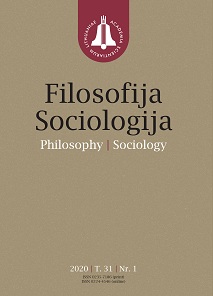Kolektyvinė sovietmečio atmintis iš meno sociologijos perspektyvos: Giedrės Beinoriūtės ir Jūratės Kluonės atvejai
The Collective Memory of Soviet Past from the Sociology of Art’s Point of View: Cases of Giedrė Beinoriūtė and Jūratė Kluonė
Author(s): Eglė TuzaitėSubject(s): Visual Arts, Recent History (1900 till today), Family and social welfare, History of Communism, Film / Cinema / Cinematography, Sociology of Art, Politics of History/Memory
Published by: Lietuvos mokslų akademijos leidykla
Keywords: memory; Soviet past; symbolic interactionism; trauma;
Summary/Abstract: The article focuses on the analysis of interpretations of the collective memory of Soviet past provided in the works of film director Giedrė Beinoriūtė and painter Jūratė Kluonė. The analysis is carried out by following the ideas of symbolic interactionism theory representative Howard Becker and is based on the results of semi-structural interviews. The article aims at connecting two usually separate fields of collective memory research in Lithuania – those of art criticism, history and sociology. Following one of the main ideas of symbolic interactionism, i.e. the meaning is created through the relationships, H. Becker describes art as ‘collective action’. In the article this idea is developed by showing that both artists explain choosing their families’ traumatic Soviet experiences as an object for their artistic creation because of their wish to give a meaning to those experiences. It is emphasized that the giving of meaning is possible only if the family’s history is shared with the society which recognizes and values the symbols of deportation and Siberia. In other words, the feeling of meaning appears when the family’s collective memory becomes a part of nation’s collective memory. Furthermore, within the framework of selected theory, it is emphasized that the presentation of the particular creation to society is a prerequisite for this creation to gain a status of a real work of art. However, nowadays it is said that the questions related to collective memory transcend the borders of national states. Therefore, it is claimed that the analysis of Lithuanian artists’ works reveals the need of similar research at the international level.
Journal: Filosofija. Sociologija
- Issue Year: 31/2020
- Issue No: 2
- Page Range: 117-127
- Page Count: 11
- Language: Lithuanian

